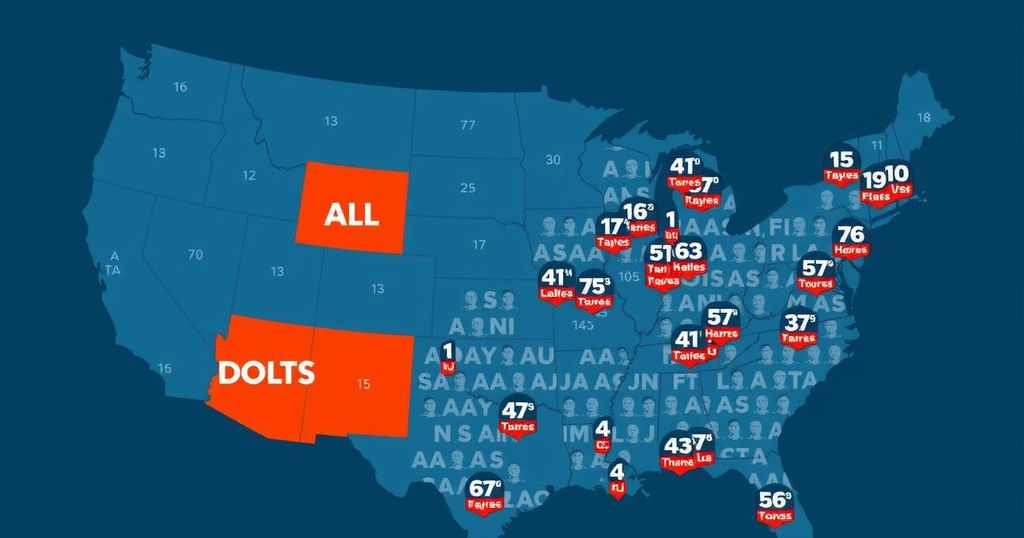Harris Regains Slight Lead in Polls Amid Electoral College Uncertainty
Vice President Kamala Harris has regained a slight lead among likely voters nationally, according to the latest ABC News/Ipsos poll, with variable demographic support and a critical focus on key issues. The Electoral College remains pivotal in determining the election outcome, as polling reflects narrow margins between Harris and former President Trump, with significant implications for various voter groups as Election Day approaches.
Vice President Kamala Harris has recently regained a narrow lead among likely voters in the United States, as indicated by the latest ABC News/Ipsos poll. However, the close race brings the outcomes of the upcoming 2024 presidential election firmly within the purview of the Electoral College, underscoring its ultimate significance. The poll reveals that a mere 2 percentage points separate Harris and former President Donald Trump among all registered voters, with Harris enjoying a slight increase in support from likely voters, leading 51% to 47%. Compared to previous findings, Harris has solidified her stance among key demographics, notably Hispanic voters, and has expanded her advantage among suburban women, while retaining robust support from Black voters. Conversely, Trump has maintained a strong foothold in rural regions and among non-college-educated white men. When examining the candidates’ perceived competency on major issues, Trump holds advantages in areas such as immigration and the economy, while Harris is favored in matters surrounding abortion and healthcare. Economic concerns remain paramount, with overwhelming numbers of registered voters deeming these issues crucial to their vote. Yet, there has been a noted decline in the urgency with which voters label the economy as the most critical element, which may benefit Harris as it aligns with her efforts to differ from the Biden administration’s economic policies. In attributes considered essential for presidential effectiveness, Harris surpasses Trump significantly, especially with regard to mental sharpness and physical health necessary for the presidency, although both candidates are nearly equal in perceived crisis management abilities. As the campaigns progress, there is a measurable demographic shift, particularly within the Hispanic community—a crucial voting bloc in key battleground states. Additionally, while Harris performs well among suburban women and Black voters, Trump’s strong standing among rural voters and white men without college degrees remains notable. The dynamics of the electoral race appear poised for change as voter enthusiasm remains high for both candidates, yet Harris holds a slight edge in voter outreach efforts. As Election Day approaches, the emphasis on voter turnout becomes increasingly salient. This latest poll underscores the importance of solidifying support among key groups and emphasizes the unpredictable nature of the Electoral College, which will ultimately determine the winner of the election. Overall, the current electoral landscape illustrates a tightly contested race, with demographics, key issues, and candidate attributes all playing critical roles in shaping voter preferences. Election turnout and the efficiency of each candidate’s campaign efforts will be pivotal as both candidates strive to galvanize their respective bases to secure victory in November 2024.
The context of the 2024 presidential election is shaped by the standings of Vice President Kamala Harris and former President Donald Trump as they vie for the support of likely voters. Polling data offers insights into shifting voter demographics, key issues influencing public opinion, and how various attributes of each candidate may sway voter preferences. Additionally, the importance of the Electoral College in determining the election outcome looms large, given the narrow margins reflected in the polls. Understanding these elements provides a deeper appreciation for the complexities surrounding the upcoming election.
In conclusion, the electoral contest between Kamala Harris and Donald Trump is exceptionally close, with voter preferences leaning slightly in favor of Harris. Various demographic trends and key issue perceptions will significantly influence the pathways to victory. As both candidates navigate this complex landscape, the critical factor in determining the election outcome will hinge on voter turnout and the effectiveness of their campaign outreach efforts, particularly in battleground states where every vote counts.
Original Source: abcnews.go.com




Post Comment